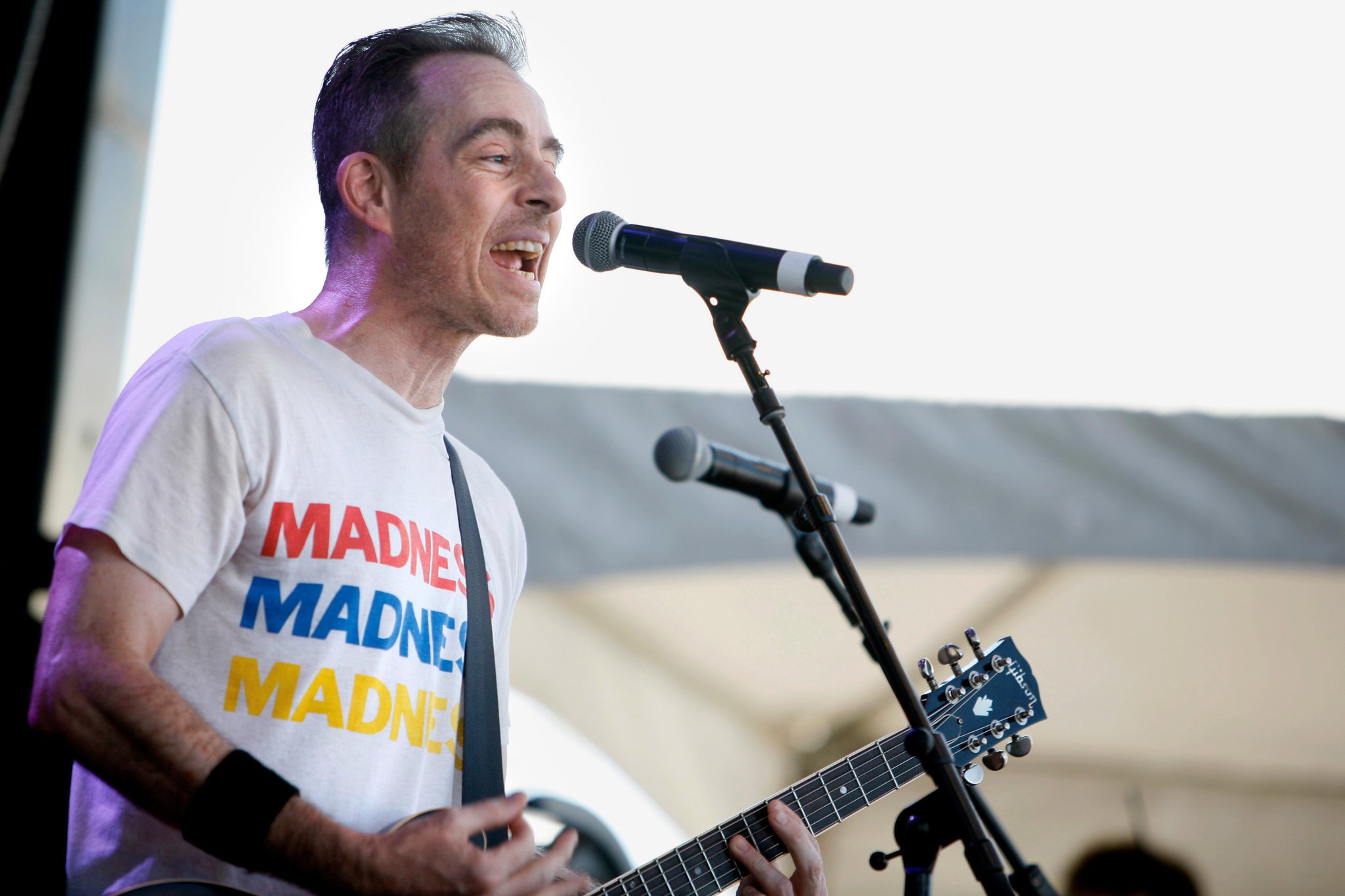
“It was about time,” said Ms. Ballance, who along with Mr. McCaughan also runs the respected independent record label Merge. “It’s all very Mac-driven. He’s always got ideas, and after a while, he resurfaces with stuff written.” It helps when he’s angry, she added.
The album’s primary emotion at times is a blinding, sputtering fury. On the squalling “I Got Cut,” Mr. McCaughan spews bile from the start: “All these old men won’t die too soon.” But there’s a recognition that anger alone isn’t productive. The anthemic chorus of “All for You” (where Mr. McCaughan sings, “Fight me!”) is a joke.
“I’ve never been in a fight,” he said. “But in the aftermath of the election, I’d leave the house thinking, if I see someone in a Make America Great Again hat, I will not be able to restrain myself. Which is an unusual way for me to go through the world. It’s not tenable.”
Mr. McCaughan’s misgivings about protest music also bubble to the surface. “Reagan Youth” is both an ode to the ’80s anarchist-punk band of the same name and a frustrated acknowledgment that the “other Reagan Youth,” those inspired by the former president who are now in positions of power in the Conservative movement, have had a more durable legacy. “That song is questioning what good did all that punk rock do?” Mr. McCaughan said. That query inevitably leads to others. “As an artist, what good am I doing? What am I going to do? Write a song? What’s that going to do?’”
According to Billy Bragg, an English singer-songwriter and a purveyor of protest music since the 1970s, what makes writing political music these days different than in previous eras is that what was once considered outrageous behavior is now shrugged at. “When the people who elected Trump aren’t even offended when you call him a liar, it makes him a very slippery customer,” he said by phone.
The music industry and the overall media landscape have been remade, too. The fading influence of radio, MTV and music magazines coupled with the rise of streaming services and social media has virtually erased the idea of a musical monoculture. “The centrality of music to youth culture, that’s changed,” Mr. Bragg said. “In the 20th century, music, for young people, was our only social medium. It was the way we talked to each other, to our parents’ generation, the way we identified ourselves. Music doesn’t have that vanguard role anymore.”

Credit
Jackie Butler/WireImage
Despite disdain for Trump from across the popular music universe (save, perhaps, country), musicians have mostly played minor roles in leading, organizing or even soundtracking the so-called resistance to his administration. Even superstars are unable to capture the attention of the masses, let alone rally them to action, in the same way it might have been possible 10 or 20 years ago. When Eminem, Kendrick Lamar or Beyoncé, who have far bigger audiences than Superchunk, inject their politics into their music, the best they can usually hope for is to generate social media hashtags or appreciative nods. But Mr. Bragg doesn’t believe it’s mass popularity that necessarily spurs real change.
“Less than 5,000 people bought Woody Guthrie’s ‘Dust Bowl Ballads.’ It’s how culture picks up on those ideas and runs with them,” he said. “Woody’s guitar didn’t actually kill fascists. It was an idea he painted on his guitar and that idea inspired people. That’s what music does.”
Ted Leo, a veteran indie-rocker who was a fierce critic of the Bush administration, and whose 2017 album, “The Hanged Man,” opens with lines about waking up after Trump’s election, “into a world of foes,” said that while “it’d be great if something I wrote opened someone’s eyes to something, it’s more for people seeking solace, inspiration or a fiery call to action.” He has no illusions that his music will “land on somebody’s desk who disagrees with me and blow their mind.” In fact, he’s pretty sure most of his fans already share his views. “The idea of preaching to the choir gets a bad rap,” he said. “One could just look at it as community-building.”
Politically charged songwriting isn’t always, or even usually, driven by the aim of affecting politics. Often, it works the same cathartic release valve as writing any other kind of song. “Through music, you can express your anger without it being a violent act,” said Rick Valentin of the Illinois-based indie-rock band the Poster Children, whose ferocious new single, “Grand Bargain!,” is indicative of the strident, political tone of a full album that will follow in May. “It’s an aggressive act but it’s not like going onto a street corner, asking people who they voted for, then screaming at them, ‘Why did you do that?’”
The musical results of all this catharsis can certainly feel like screaming into a void, but the goal for many of these artists is accomplished by these songs’ mere existence: to keep pessimism, cynicism and nihilism at bay.
“Music isn’t necessarily going to change what’s happening in the world, but it does make a difference in people’s lives,” Mr. McCaughan said. “It gives me a sense of purpose and somewhere to put stuff that’s happening in my head.”
Continue reading the main story
Powered by WPeMatico

